Precursor to the Mỹ Lai Massacre: 1968 Phong Nhị, Phong Nhất_34: Che Guevara to Ho Chi Minh
Click to read in Korean(체 게바라와 호찌민 사이, 1968년 그날)
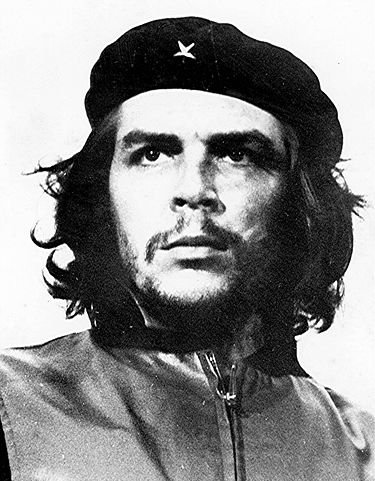
Che Guevara(1928~1967) Photo Wiki Media
On October 9, 1967, Argentine and Cuban revolutionary, Che Guevara passed away. [1]
Around 1 p.m. that afternoon, he greeted his final moment with dignity in a small rural classroom in Chaco, Bolivia. He was shot in the right calf, had his beard pulled out and his hands tied behind his back. Che, or Che Guevara, stared squarely into the eyes of the Bolivian government sergeant Mario Teran, who held a pistol in his hand, and said, "Don’t be afraid! Pull the trigger!" Mario Terran trembled. Terran hesitated even at the urging of Bolivian military officers and U.S. CIA agents next to him. It was only after a few drinks that he was able to pull the trigger. The bullet didn’t quite hit the target, prolonging Che’s life a bit longer. His corpse was transported to a base in Vaye Grande, Bolivia, in the time it became October 11th from October 10th, and was cremated in a remote location on the 11th.
"It was a tough day. I was so exhausted that I clenched my teeth." (Feb. 23) "A gloomy day." (Feb. 25) "The prospect is getting narrower, and napalm bombs continue to explode." (March 28) "I didn't have the courage to shoot two soldiers passing by in a car." (June 3) "My asthma is becoming serious, but I don’t have any medication for it." (June 23) "It was a very depressing day." (June 26) "My comrades call me Bakunin (Russian “anarchist)." And they pity the blood shed so far, as well as the blood that will be shed in the event of another Vietnam." (July 24) "I stopped marching at two o'clock in the morning and took a rest. I was so exhausted that I couldn't take another step" (Oct. 7).
His last diary entries of 1967 in the jungles of Bolivia are wet with despair. Che truly tried to stir up “two, three, many Vietnams” there. He vowed to decentralize and weaken the power of the United States, declaring throughout his lifetime. "I, as a Cuban-Argentine, am willing to sacrifice my life for the freedom of any Latin American nation."
Che became Che Guevara only after he embarked on his path to revolution. Born to an upper-class white family in Argentina in 1928, he went by the name, Ernesto Guevara de la Serna until, even up until he earned his M.D. degree at the age of 25. After leading the Cuban revolution to victory in 1959 with Fidel Castro (1926-2016), he became the industry minister after serving as the president of the Cuban National Bank. He had finally reached a point where he could live comfortably without being ridiculed. In April 1965, after parting with Cuba, he went to support the Revolutionary Armed Forces of Congo in Africa. On November 3, 1966, he arrived at the Lafaz airport in Bolivia disguised as a bald scholar who came to study the local society and economy with his Uruguayan passport. Four days later, he moved to the mountainous area in the city of Rankau-Ashu. He launched guerrilla warfare with 53 anti-dictator special forces members. The endeavor was full of difficulties, and to his surprise, the Bolivian people did not welcome him enthusiastically as he had expected. Neither did help come from the Soviet Union, which was a direct opponent of the U.S. The Soviet Union, which suffered a brinkmanship with the U.S. over the Cuban missile base between October and November of 1962, preferred not to clash with the U.S. over Latin America. The Lyndon Johnson administration of the United States ordered the Bolivian army to kill Che. The effect of the propaganda informing the world that Che had completely failed to overthrow the world and died in battle was great. Che was only 39 years old.
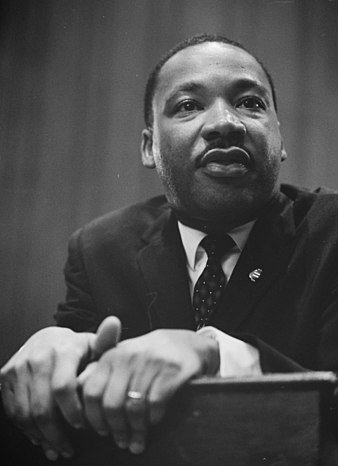
Martin Luther King(1929~1968) Photo Wiki Media
On April 4, 1968, the American Baptist minister and black civil rights leader, Martin Luther King, Jr. died.
At 6:01 p.m. that day, he was shot on the balcony of the second floor of the Lorraine Motel in Memphis, Tennessee, while talking to a friend about going out for dinner. The bullet pierced his right cheek and passed his jaw into his shoulder. He had come to Memphis to empower the union of black street cleaners who were on strike. He received emergency care, but died within an hour. The perpetrator was an escaped convict named James Earl Ray. It had been three and a half years since Malcolm X, a Muslim and radical African-American liberation activist, was killed in Manhattan, New York, on February 21, 1965. But in a similar fashion, the dark shadow of assassination passed over the non-violent pacifist black activist, Martin Luther King, Jr.
"I have a dream that my four little children will one day live in a nation where they will not be judged by the color of their skin but by the content of their character." (his speech at the March on Washington for Jobs and Freedom on August 28, 1963).
King moved step by step toward that dream. Even until the early 1960s, African Americans were not treated like humans. They were not allowed to marry white people, they were not allowed to attend school with white people, and they were banned from most restaurants. Only the rear seats were available in cinemas, theaters, buses and subways. In 1955, a black woman was arrested by the police for refusing to give up her seat to a white man on the bus in Montgomery, King’s hometown. King led the bus boycott, winning a federal Supreme Court ruling that the bus company's segregation policy was unconstitutional. He thus became a famous leader of the Black Civil Rights Movement.
He had to pay a terrible price for his movement, however. He was arrested by police, stabbed and even had his home detonated. His principle of nonviolent resistance which he learned from Gandhi did not waver, and his struggle led to the enactment of the Civil Rights Act in July 1964 which prohibits racial segregation in public places and schools. King became the youngest Nobel Peace Prize winner of all time in 1964 at the age of 35.
King's campaign for black civil rights has led to the criticism of the city's issue of the poor and a holy battle against the war since 1966. The Vietnam War was a reckless act from his perspective. Instead of pouring money on the battlefields of a foreign country, the U.S. should have been fighting poverty on its own land. Spending so much on the Vietnam War also contradicted President Johnson's "great society" policy of fighting unemployment and poverty. Eighty percent of the U.S. troops drafted into the Vietnam War came from the working class or poor families. The death rate for black people was double. The elimination of racism and the opposition to the Vietnam War were not two separate issues but rather one issue with the same underlying cause. King participated in a massive anti-war peace march in New York on April 15, 1967. 250,000 people had gathered. That summer, black people, desperate from poverty, set fire on the streets and looted shops. Forty-three people were killed during the police crackdown. On October 21, some 100,000 people marched to the Pentagon where the U.S. Department of Defense is located. The young men took out their draft warrants and burned them. Some of the protesters placed flowers in the gun barrels of the police, but they still could not avoid the beatings. American society was turning into a huge mess of racial conflict and anti-war movements.
On April 9, 1968, a funeral was held at the Ebenezer Church in Atlanta, Georgia. It was the church where King's father worked as a pastor. The whole nation was rocked by the riots of black people stirred by King's death. Nineteen people lost their lives. On April 23, Columbia University students occupied five of the university buildings. They had anti-Vietnam War and anti-racism slogans. A week later, the police stormed in. 150 people were seriously injured and 700 were arrested. The university occupation movement spread to other universities as well. President Johnson passed a bill that would ban racism in stores and accommodations. King was 39 years old.
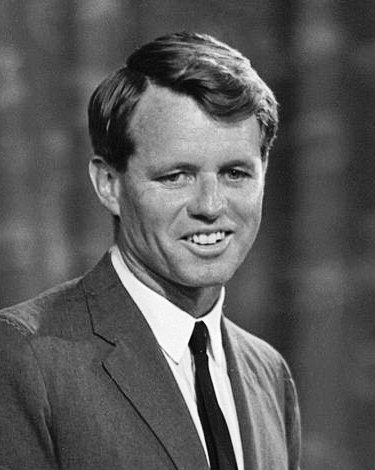
Robert Kennedy(1925~1968) Photo Wiki Media
On June 6, 1968, Bobby died.
He, a U.S. senator and preliminary Democratic presidential candidate, was shot while passing by the cooking area of the Los Angeles Ambassadors Hotel the night before on the 5th. Robert Kennedy, nicknamed "Bobby," was staying in California to deliver his preliminary election speech. The gunman was a Jordanian immigrant in his 20s named Sirhan Bishara Sirhan, who was unhappy about Bobby's support for Israel. He was taken to a hospital with a severe gunshot wound to the head, along with five injured attendants, but failed to gain consciousness again. It was four years and seven months after his second brother, President John F. Kennedy, was shot to death in Dallas, Texas, on November 22, 1963. Americans had lost yet another promising politician.
Edward Kennedy, the youngest of nine Kennedy siblings, read his eulogy at the funeral in St. Patrick's Cathedral in New York on June 8. "My brother need not be idealized, or enlarged in death beyond what he was in life; to be remembered simply as a good and decent man, who saw wrong and tried to right it, saw suffering and tried to heal it, saw war and tried to stop it. Those of us who loved him and who take him to his rest today, pray that what he was to us and what he wished for others will someday come to pass for all the world.”
Bobby was the seventh oldest among the siblings. When his second brother, John F. Kennedy, was elected president in 1961, he took the post of attorney general. Since taking office, he had declared war on crime, fighting to wipe out mafias, and received acclaim for contributing to improving black civil rights. When Martin Luther King was arrested in 1960 for a sit-in at a department store, Bobby was the attorney who called the judge and released King. He was elected to the Senate in New York in 1964 after his brother's death. He declared his presidential bid in March of 1968. The elder Johnson, a Democrat-turned-current president, had declared he would give up his presidential bid. Bobby was making a splash in the Democratic preliminary election in early June 1968, right before he was about to be shot. Having been opposed to the Vietnam War since 1967, Bobby was the hope of the anti-war forces.
Vietnamese and Americans were killed alike in Vietnam. In February of 1968, as many as 2,000 U.S. soldiers were killed while responding to the Tet Offensive staged by the Viet Cong. The gruesome footage of the television spread across the living rooms of the American people. The U.S. mainland was also akin to a battlefield. On February 8, 1968, the police opened fire on a peaceful anti-war demonstration in Orangeburg, South Carolina. Three black people were killed and 34 others wounded. The hawks still didn’t come to their senses, however. General Westmoreland, commander of the U.S. Army in Vietnam, called on President Johnson to send an additional 200,000 troops to Vietnam. General Abrams, who assumed the post of commander after Westmoreland even said halting the bombing of Northern Vietnam would put the U.S. military into a state of crisis.
On August 26, 1968, a Democratic convention was held on Chicago’s International Amphitheater Avenue. Bobby was of course absent. Senator Eugene McCarthy won the preliminary election, but Hubert Humphrey, backed by party leaders, was nominated. The anti-war clause put forth by Eugene McCarthy's supporters, never reached the party platform. More than 4,000 people, including members of an anti-war group trying to block Humphrey's nomination, demonstrated outside the convention hall. Jerry Rubin, the leader of the "Yippies,” an International Youth Party," ridiculed the Democratic Party by presenting a pig as its presidential candidate. Police attacked the protesters with rifle headboards and clubs for failing to their follow orders to leave. That day remained a "bloody convention." Three months later, in the November presidential election, the Democratic Humphrey lost to Republican anti-communist Richard Nixon by a 0.7% point difference. What kind of expression would Bobby have made at the news? He would have been 42 years old that year.
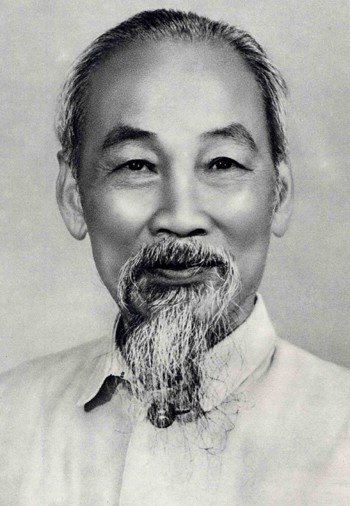
Ho Chi Minh(1890~1969) Photo Wiki Media
On September 2, 1969, Uncle Ho, the national leader revered by the Vietnamese, died.
At 9:45 a.m. on the day of the 24th anniversary of Vietnam's independence, his pulse, which was running irregularly, stopped with him on the hospital bed. He left Saigon in June of 1911 to work as a kitchen assistant on the French steamer, Amiral Latouche-Treville. He returned home in 1945, after traveling around the world, including Europe, Asia, Africa, and the United States. He would then become a big figure for the next 24 years in Vietnam's independence movement and revolution. His will requested that his body be cremated, divided and scattered onto the northern, central and southern parts of the country and that the exact locations not be revealed. His will reflected his life-long devotion to the country’s reunification, though his body was not cremated. Instead, it was mummified.
Ho Chi Minh was the founder of Vietnam's Communist Party and the leader of Vietnam's Democratic Republic (North Vietnam), as well as being Vietnam's most symbolic figure. Nevertheless, the Vietnamese people still refer to him as Bác Hổ’, meaning “Uncle Ho.” The most powerful image was that of the 'Modest Saint.' He appeared kind, selfless, and honest. He wasn’t ostentatious, was unmarried, and lived in a small house. It was like Lenin from the Russian Revolution and Gandhi in the Indian National Liberation Movement. A Uruguayan newspaper described him as someone with a heart as wide as the universe, and a man with an unrelenting love for children. It said he was modest in all senses of the word, in its expression of condolence. South Korean soldiers dispatched to Vietnam felt confused when even the South Vietnamese soldiers fighting against North Vietnam said their most respected figure is Ho Chi Minh. Without him, the country of Vietnam was hardly conceivable. Naturally, the U.S. was projected as the devil afflicting saints like Uncle Ho.
Uncle Ho became feeble in his later years. Vietnam's ruling Workers' Party (later renamed the Communist Party of Vietnam) was a collective leadership system. Soon after Lê Duẩn took office as general secretary of the Vietnamese Workers' Party in 1957, Uncle Ho's influence began declining rapidly. His main role in the mid-1960s was to visit schools, factories and collective farms as the "benevolent uncle" that he was and spreading the great cause of socialism and national reunification. Whenever there was an important problem, Lê Duẩn was quoted as saying to his colleagues. "Let's not worry Uncle Ho. We shouldn't bother our top leader."
In the late 1960s, Uncle Ho's army increased to more than 400,000 people. All men between the ages of 16 and 45 were conscripted. More than 50,000 U.S. soldiers died during the Vietnam War. More than 5,000 South Korean soldiers died. Meanwhile, one million people from North and South Vietnam combined, lost their lives. In 1967, U.S. President Johnson wrote in a letter to Uncle Ho that he was willing to end the bombing, but that it would only happen when North Vietnam stopped infiltrating the South. Uncle Ho sent a reply demanding unconditional suspension of the bombing of the Vietnamese Democratic Republic. Johnson only actually thought to stop the bombings after the Tet Offensive in March of 1968. On May 10, peace talks between the United States and the Vietnamese Democratic Republic began in Paris, France, yet peace was hardly achieved easily. The bombing continued after Nixon became president in November 1968. Even in September of 1969, when Uncle Ho's pulse was dying down, it was unclear when the war would end. He was 79 years old by then.
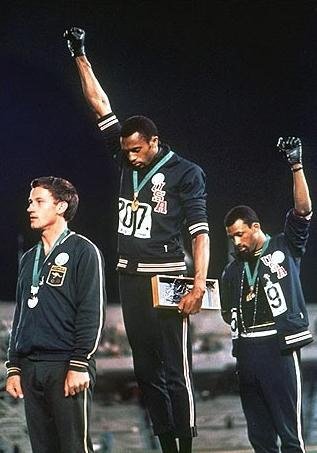
African-American athletes, Tommy Smith and John Carlos, who won the gold and bronze medals respectively in the men's 200-meter final at the October 15, 1968 Mexico Olympics, raised their fists to the national anthem during the awards ceremony in a silent protest called the "Black Power Salute." Their actions, greatly influenced by Martin Luther King, Jr., became an important occasion to promote black civil rights movementsand the fight against racism to the world. The two athletes, however, were expelled from the U.S. team thereafter and lost their medals for their political messages.
And then there’s February 12, 1968.
What did the year 1968 signify? I refer to it as the time between Che Guevara and Ho Chi Minh. Both are zeitgeists that represent the year 1968. Flames of protests against the Vietnam War, which erupted on May 2 that year at the University of Nanterre in western Paris (thereafter the 10th University of Paris), spread uncontrollably and soared in protest against the police's violent crackdown and the school authorities' unilateral closure of the school premises. At first, the Parisian students created coalitions among themselves, but eventually, they joined hands with the laborers. Eventually, young people from dozens of countries came together in a worldwide struggle. Germany, Italy, Britain and Spain as well as the socialist country Czechoslovakia and Mexico joined forces. The U.S., which had been reeling from black civil rights movements and anti-war movements, was no exception, especially after Martin Luther King, Jr. and Robert Kennedy were shot. College students, whose number had tripled since World War II, began throwing stones at the windows of the old world.
Their placard displayed a picture of Che who had just passed away. Che was the spiritual supporter of those who dreamed and imagined the impossible. They repeatedly chanted Che's slogan of creating Two, Three, Many Vietnams. They also chanted "Ho! Ho! Ho Chi Minh."
"What was most shocking to me was that the highly developed, ultra-modern America and its forces would attack Vietnamese farmers, like white settlers attacking the North American Indians" (Michael von Enlhardt, a German student).
The authorities of European universities, who shunned out even small demands such as eliminating male and female dormitories (Nanterre University), were considered to be in the same camp as the U.S. military. They were no different from the U.S. aggressors in the sense that there was no reasoning with them. Women who were discriminated against and sexual minorities also worked together. The wave of student movements developed beyond the democratic movement into a cultural revolution.
The global struggle of 1968 was later dubbed the '68 Movement.' British historian Eric Hobsbawm said that the 68 Movement was the only simultaneous social upheaval in the world since World War II. U.S. scholar Immanuel Wallerstein said that there have only been two world revolutions so far. One occurred in 1848 (the February Revolution in France) and the other in 1968. Both ended in historical failure, but both have changed the world.
George Katsiaficas, who in 1968 worked with the Massachusetts Institute of Technology branch of the American student movement organization, the Student Democratic Society (SDS), organized a large rally to protest the university's research institute, which developed inertial navigation systems and fluoride for the Vietnam War, and to insist on the withdrawal of U.S. troops from Vietnam. He later described the year 1968 as having a "global eros effect," describing the global connection of the uprising, in which awareness of the "instinctive desire for liberation" superseded time and space and created simultaneous resonance all over the world. Although the revolution faced limitations and was never entirely completed, it changed the world and stimulated the people of Asian and African countries who had put off their transformation struggles to a distant future.
In 1968, the time between Che Guevara and Ho Chi Minh when the world was stirred with eros, the Republic of Korea was "under the world’s highest iceberg, the 38th parallel and its lump of iron," as described by poet Kim Soo-young.[2] On February 12 of that year, the Korean army attacked a rural villages of Phong Nhị and Phong Nhất. Seventy-four people died, including old farmers and their sons, daughters, and grandchildren. Four of them, Trần Thị An,Trần Văn Mạnh, Nguyễn Đình Đào, and Đoàn Thế Minh, were all less than a year old.
[1] In writing this chapter, the following books and papers were referred to or cited: "The Biography of Che Guevara" (Jean Cormier, Practical Literature, 2000); "My Life: Bill Clinton”(William Jefferson Clinton, Mulpeure, 2004); "Martin Luther King, the Black Jesus' Dream" (Kartin Haneman, Hankyoreh Children, 2010); "The Biography of Ho Chi Minh" (William J. Ducer, Green Forest, 2003);“1968: A Student Generation in Revolt” *Ronald Fraster, Park Jongchul Publishing 2002); “A Walk through the modern history of the U.S.”(Kang, Joon-man, Figures and Ideology, 2010); “U.S. History as it is”(Alan Brinkley, Humanist, 2005); “The Imagination of the New Left”(George Katsiaficas, Nanjang, 2009); “1968, Revolution in the World System” (Immanuel Wallerstein, Economy and Society, 2008 Winter Edition).
[2] "The 38th parallel is one of the highest icebergs in the world. How much silent warmth of deep love is needed to melt this lump of iron? It would have to be quieter than the melting of the bathtub that I felt." 『The Complete Works of Kim Soo-young 2』 p 96~97 “Thawing” 解涷(1968.2, Minumsa, 1981)
- Written by humank (Journalist; Seoul, Korea)
- Translated and revised as necessary by April Kim (Tokyo, Japan)
The numbers in parentheses indicate the respective ages of the people at the time in 1968.